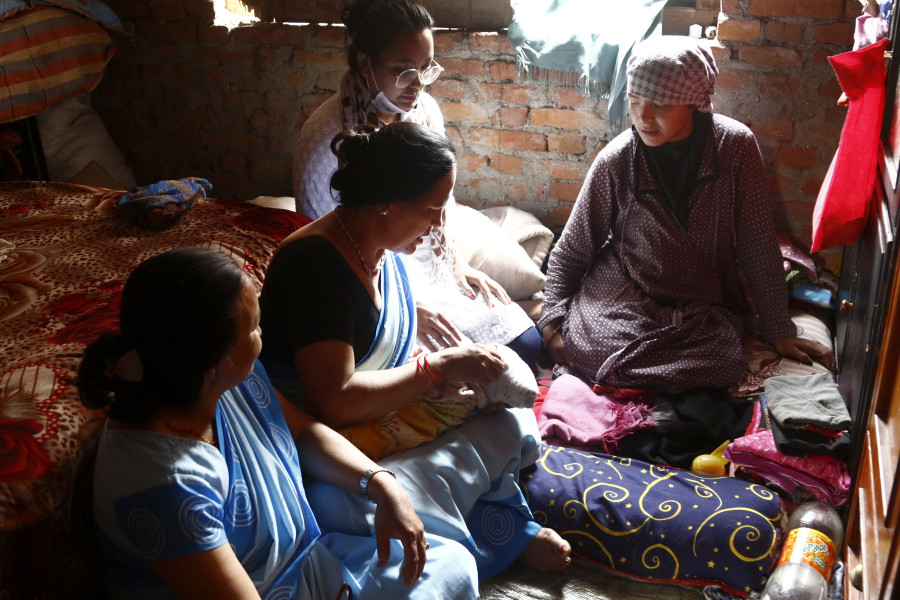National
Female community health volunteers: unsung heroes shouldering huge responsibilities with minimal return
Nepal's improvement in health indicators is largely credited to the thousands of these health volunteers who have been working untiringly for the last 31 years.
Arjun Poudel
When Sita Pandit started working as a community health volunteer a little over three decades ago, her duty was to make door-to-door visits in her neighbourhood, which today is part of Suryabinayak Municipality in Bhaktapur, distributing contraceptives—hormonal pills and condoms.
Gradually, government officials assigned her more duties, involving her in maternal health programmes, which were followed by child health programmes, communicable diseases, vector-borne diseases and other health-related campaigns.
Pandit, now 54, is one of the 51,423 female community health volunteers who work as a bridge between the health facilities and the local people across the country. They are the backbone of the country’s health system, to which hundreds of thousands of people still do not have access.
Over the years, the number of health programmes, where the participation of female community health volunteers is indispensable, has increased. But the government has failed to provide female community health volunteers with the facilities that they deserve.
Pandit, who was awarded on the occasion of the 16th Female Community Health Volunteers Day on Thursday, told the Post over the phone that it’s been only a few months that female community health volunteers started receiving a monthly salary of Rs 1,000.
The amount is too paltry, given the contributions of female community health volunteers in the country’s health care system.
"Earlier, we didn’t even have a monthly salary,” Pandit said.
Female community health volunteers were told by government officials how critical their roles were in mitigating the burden of non-communicable diseases. Knowing that they were serving their communities was the only incentive for Pandit and other female community health volunteers like her.
Most of the health programmes which have active involvement of female community health volunteers have had a huge success rate.
Nepal successfully reduced the maternal mortality rate from 539 in 1996 to 239 in 2016—for which the country received the Millennium Development Goal award. This achievement would not have been possible if not for the hard work of female community health volunteers.
Vitamin A supplement and de-worming programmes have over 90 percent coverage rate, while the prevalence of communicable diseases like diarrhoea, typhoid, jaundice has significantly declined.
Likewise, the decline in population growth is also credited to the availability of contraceptives in which the health volunteers have played a crucial role.
Moreover, mothers group under such health volunteers also played a crucial role in empowering women and mitigating violence against women.
Dr Baburam Marasaini, a public health expert, admits that female community health volunteers are overworked and underappreciated. It’s high time that the government increased perks and facilities for female community health volunteers, he said.
"Even during the time of Maoist insurgency, female community health volunteers had successfully fulfilled their duties, at times even risking their lives,” Marasini said. "We had once even lobbied with the UNICEF and other international organisations to award Nobel Peace Prize to our female community health volunteers for the role they have played in our health sector.”
Officials at the Ministry of Health and Population also concede that female community health volunteers have to fulfil more responsibilities than any other health workers for little to no incentives.
As the ongoing employment adjustment process has created a mess in the health sector, leaving scores of health facilities without health workers, the role of female community health volunteers has become even more important.
Roshani Laxmi Tuitui, director at the Nursing and Social Security Division under the Department of Health Services, said without the active participation of female community health volunteers, achieving any health goals, including the sustainable development goals, would have been unimaginable.
"We have been working to engage them in awareness drives against the non-communicable diseases and others," said Tuitui. "We believe that our health volunteers can play an outstanding role.”
According to her, health volunteers have more responsibilities and they carry out more works than health workers, for which they should be appropriately rewarded.
“The government must revise the facilities given to them,” said Tuitui.




 16.12°C Kathmandu
16.12°C Kathmandu














